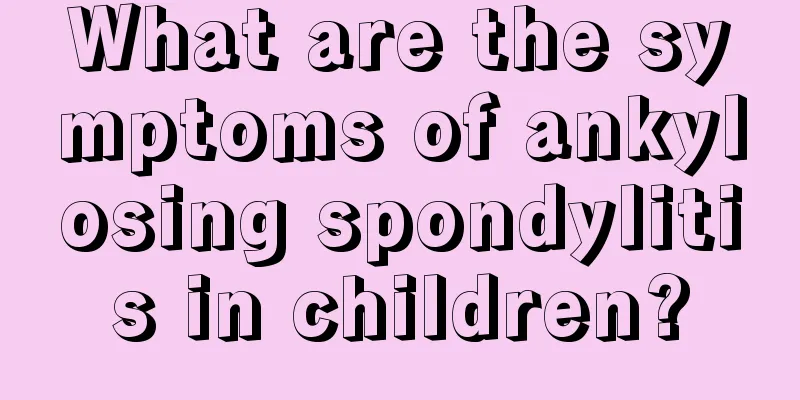What are the symptoms of ankylosing spondylitis in children?

|
Ankylosing spondylitis has always been an orthopedic disease that people are more familiar with. If you suffer from this disease, it will have a great impact on the patient. Severe cases may lead to loss of mobility. Therefore, ankylosing spondylitis has always been a disease that people are more afraid of. This disease is highly hereditary. So what are the symptoms of ankylosing spondylitis in children? Let me give you a detailed introduction! Children with ankylosing spondylitis have high fever during the acute stage, and the high fever symptoms are staged. Chronic disease generally presents as low-grade fever, significant weight loss, general fatigue, local muscle atrophy, and is often accompanied by severe symptoms of large peripheral joints and axial joints, with hip arthritis being the most common. A few children have swollen lymph nodes and mild or severe anemia. Children with ankylosing spondylitis do not develop peripheral joint lesions, only recurrent iritis that can last for several years. Early iritis may be the only manifestation of ankylosing spondylitis, manifested as unilateral eye redness, pain, photophobia, amaurosis, etc., which may affect both eyes successively, alternating between mild and severe symptoms, and generally lasts for 4-6 weeks. Iritis generally has no sequelae. A small number of children with ankylosing spondylitis develop aortic regurgitation, severe aortic regurgitation is rare, and some cases of ankylosing spondylitis have nonspecific conduction block lesions. In patients with severe spinal involvement, involvement of the sternocostal joints may affect respiratory function. In patients without severe spinal involvement, chest mobility is generally not affected and breathing is not changed. Ankylosing spondylitis is more common in older children, with more boys than girls, with a male-to-female ratio of about 7:1. In 80%-90% of cases, peripheral joint or enthesitis is the main symptom, and usually mainly in the lower limbs, with symptoms such as low back pain, morning stiffness, limited movement, or sacroiliitis on X-ray. The number of affected joints is generally less than 10, oligoarticular disease is more common than polyarticular disease, and the disease is often unilateral or asymmetric. Sometimes it also manifests as monoarthritis, oligoarthritis or enthesitis, which may persist or recur for months or even years. More than 85% of the cases involve lower limb joints, while upper limb arthritis is rare. Oligoarthritis is generally unilateral or asymmetric, while polyarticular arthritis is generally symmetrical and is often misdiagnosed as rheumatoid arthritis. The above are some symptoms of ankylosing spondylitis introduced by the editor. If a child has a low fever for a long time, it may develop into ankylosing spondylitis. Therefore, it is best to take precautions in advance when the child is young. Most children will get some vaccinations. As a parent, you must take preventive measures to ensure that your child grows up healthily. |
<<: What should I do if my child has umbilical hernia?
>>: What should I do if my child has enlarged nasal conchae?
Recommend
What are the symptoms of neonatal hemangioma?
Many newborn babies will have hemangioma, a benig...
What should I do if my 2-year-old baby has bloodshot eyes?
Sometimes, only adults will have red bloodshot ey...
Can a nine-month-old baby drink soy milk?
If there is a baby at home, then the baby's e...
Nursing care for mild hypoxia in newborns
How to care for a newborn with mild hypoxia? Hypo...
Newborn baby's white eye has red bloodshot
Having a baby is a very happy thing. Raising a ch...
What is the reason for the baby's heavy sweat hair?
Everyone knows that no matter which hair in the b...
Newborn baby's throat gurgling when drinking milk
If a newborn baby makes some throat noises when d...
Babies who sleep lightly are easily frightened, parents should pay attention
Scientists have clearly stated that deep sleep is...
Treatment for diarrhea in breastfed babies
The problem of diarrhea in breastfed babies makes...
What to do if your child always has itchy scalp
Because the human scalp is always covered with a ...
What to do if baby's hands are scalded and blistered
Many parents are careless when taking care of the...
Why do children have bad breath?
We always think that bad breath is something that...
Why does the child cry when he wakes up?
It is normal for children to like crying, but in ...
Do mothers know the height standard for two-year-old babies?
Every mother has been looking forward to her chil...
Why does a two-year-old baby sneeze and have a runny nose?
If a two-year-old baby sneezes and has a runny no...









